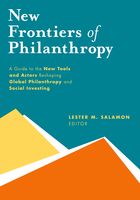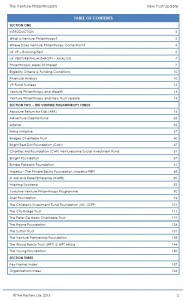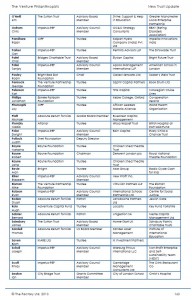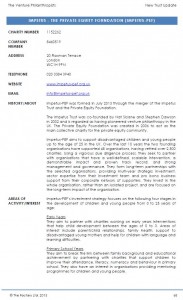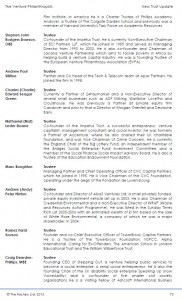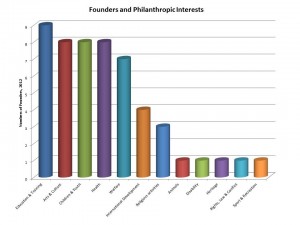New Frontiers of Philanthropy (Oxford University Press, 2014) is the Haynes manual for new philanthropists. With this book we can open up the engine of new philanthropy and check out the workings. With 653 pages plus an extensive bibliography it is a substantial volume covering the people and organisations involved in new forms of philanthropy, the tools that they are using, and key issues.
Whether you are a fundraiser working with philanthropists or foundations, a researcher trying to understand philanthropy, the manager of a family foundation or a financial adviser you will find lots to interest you here.
The book has three main sections:
“New Actors” deals with new organisations in the philanthropy and social area. These new actors may be assembling capital, providing secondary markets or exchanges, or prospecting for new ventures, and Professor Lester Salamon makes clear in his introduction that many fundraisers are not considering our do not understand some of the key actors in finance, such as pension funds.
The section includes some terminology from the finance sector that we are going to have to get used to applying in the non-profit sector: “capital aggregators” for example are essentially fundraising organisations such as community foundations.
The increasing involvement of business in charitable activities is highlighted – and Rick Cohen contributes a chapter on corporate-originated charitable funds, such as the Fidelity Charitable Gift Fund with US$3.8bn in assets under management. These funds are growing faster, operating more efficiently, and selling more aggressively than their purely charitable counterparts, trends highlighted by Prof. Salamon who notes that commercial donor-directed funds are now larger than community foundations in the USA.
Because the book’s scope is so wide it includes entities that are on the margins between charity and business, or “impact-first” and “finance-first”. It includes a deal of material on businesses that are focusing on the “base of the pyramid” (the poor). For Prof. Salamon these are businesses that are meeting a social need; for me these are simply businesses dealing with a different market segment.
“New Tools” is an encyclopaedic description of the many different ways in which someone who wants to do social or environmental good might go about it. It covers loans, social impact bonds, socially responsible investment, new forms of grant making including prizes, crowdfunding… and more. Fundraisers and financial advisers should take the time to read this section because it will inspire both to try new products with their philanthropic customers.
The third section in the book, “Cross-Cutting Issues”, debates the issues that emerge from the new philanthropy including “the elusive quest for impact”. Dr Alex Nicholls and Rodney Schwartz send out a wake-up call to the fundraising community, with a chapter on the demand side of the social investment marketplace, saying that the challenge is “..not an insufficient supply of social investment capital but an insufficient supply of investment-ready deals.” (In plain fundraising speak: ‘there are lots of donors, but not enough well-prepared proposals’.)
In this section there is a thoughtful piece by Dr Maximilian Martin giving the global perspective on new philanthropy. Dr Martin challenges the conventional view, arguing that social capital markets are inefficiently relationship-driven, not value-driven. He is subtly signalling the limits of relationship fundraising, noting that “…nonprofit leaders typically spend vast amounts of time on fundraising rather than on the continuous improvement of the work of the organizations they lead.” [p.608] He creates the phrase “synthesized social businesses” to suggest that we should move from a world of small fragmented organisations to one in which we build larger business ventures with a social purpose. “A philanthropic foundation could acquire [control over] …a company with the mission to make the good or service available to as many people as possible around the world.”
If you want to understand what is happening out at philanthropy’s cutting edge, this is the book for you. No-one in the book is claiming that all our donors are going to be asking us about making a quasi equity investment in our social enterprise next week. But the evidence from the impact of the venture philanthropy movement in Europe is that these ideas are already circulating in a donor community that is looking for change.
Be prepared for the new philanthropy; read this book.
Factary and the new philanthropy
Factary has monitored and researched the new philanthropy for many years. We were the first research group to publish a report on venture philanthropy in the UK and we continue to monitor new developments. Contact Nicola Williams, nicolaw@factary.com or Chris Carnie, chris@factary.com if you would like to know more about our services in this area.

